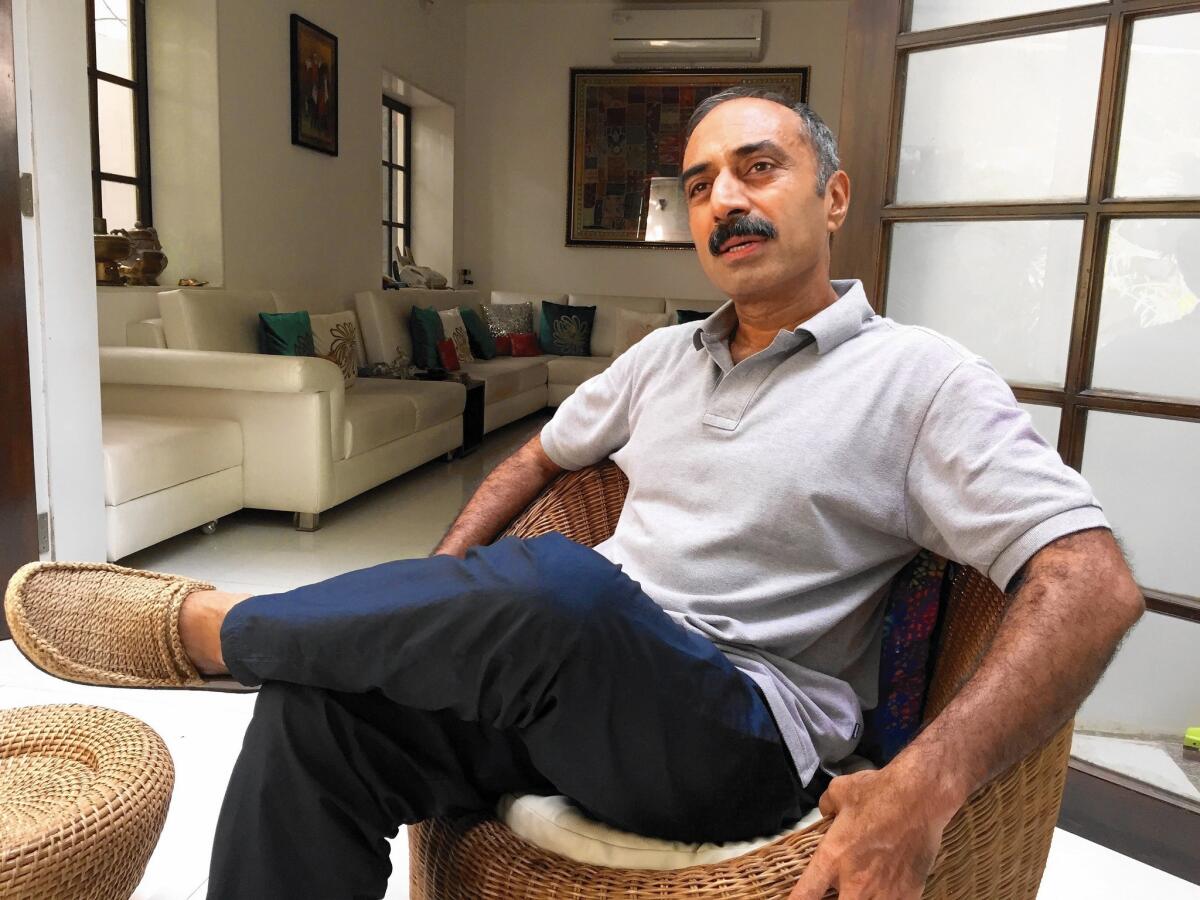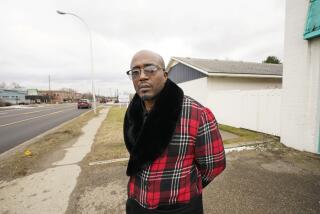India police officers feel targeted for offering evidence against prime minister

reporting from Ahmedabad, India — One police official saw his promising career flatline and was dogged by minor misconduct charges until he took early retirement this year.
Another endured a long suspension before being fired last month, but not before a sex video surfaced that purported to show him with a mistress. (Apart from the receding hairline and healthy mustache, his wife said, he looked nothing like the man on screen.)
A third faces a possible inquiry into decade-old charges of disclosing sensitive information. It could cost him his pension.
The three former officials say they have been targeted for offering evidence potentially damaging to India’s prime minister, Narendra Modi, in a protracted investigation into one of India’s worst bouts of religious violence in recent decades.
At least 1,000 people, mostly Muslims, were killed in the 2002 riots in Gujarat state, which Modi, a longtime Hindu nationalist, led before becoming prime minister. Now, as a state court hears arguments that Modi and dozens of other officials should face criminal charges in the bloodletting, the former civil servants say Modi’s government has launched legal and administrative actions against them in an effort to taint their testimony.
“They are going after one whistle-blower after another who is creating problems for them,” said R.B. Sreekumar, the retired former director-general of police in Gujarat, whose pension is at risk. “They want to punish us and discourage others.”
On the eve of Modi’s second U.S. visit — which will include a stop in Silicon Valley to push for greater digital investment in India — memories of Gujarat have resurfaced. Last month, more than 100 American university professors signed a letter highly critical of Modi’s human rights record, saying “there is still an active case in Indian courts that questions his role in the Gujarat violence.”
Modi, 64, has denied culpability. Nalin Kohli, a spokesman for Modi’s Bharatiya Janata Party, said there was no vendetta against the ex-police officials and the cases against them would be judged on their merits.
“These are convenient allegations, but they are not substantiated by facts,” Kohli said. “If they have not flouted any laws they have nothing to fear.”
Over several weeks in early 2002, witnesses say, Modi restrained police from intervening as Hindu mobs, avenging an attack on a train carrying Hindu activists, laid siege to neighborhoods dominated by the Muslim minority.
A Supreme Court-ordered investigation concluded in 2012 that there was not enough evidence to charge Modi or dozens of top officials with crimes. But an appeal filed by Zakia Jafri — the widow of a Muslim lawmaker killed by a mob in Ahmedabad, Gujarat’s largest city — claims the investigating team wrongfully ignored testimony implicating Modi and 59 other officials.
Jafri’s appeal, which Gujarat’s high court began hearing last month, rests largely on accounts and records produced by the whistle-blowers, whose testimony has become public through leaks, news reports and court documents.
Since Modi ascended to India’s top office in May 2014, the former police officials say pressure on them has increased.
“It has felt very lonely,” Sanjiv Bhatt, the former senior police intelligence official who was recently fired, said in an interview at his bungalow in Ahmedabad.
In 2009, Bhatt told the Supreme Court-appointed investigators that hours after the train attack, he went to a meeting of security officials at which Modi said Hindus should be allowed to “vent their anger.” To Modi’s critics, it is the most damning piece of testimony against the prime minister.
But other officials have said Bhatt did not attend the meeting and that Modi gave no such order. Detractors describe Bhatt as a disgruntled, attention-seeking officer who hates Modi, whom he has referred to as “Prime Moron.”
Zakia Jafri’s lawyers say Bhatt’s allegations should be tested in court. They contend that his account is bolstered by cellphone records obtained by a third whistle-blower, former Gujarat deputy police commissioner Rahul Sharma, which show that Bhatt was in the vicinity of Modi’s official residence the night of the meeting.
In 2011, after an Indian news magazine published Bhatt’s story, he was suspended over accusations that he missed work to testify in the investigations. Bhatt maintains that his absences were authorized.
The day Modi became prime minister, the Gujarat government wrote to India’s home affairs ministry in New Delhi asking for the case to be expedited, according to a report in the Economic Times. In late August the ministry terminated Bhatt, an extreme punishment in India’s clubby civil service.
Just before his dismissal, on a national holiday marking India’s independence, two police officers showed up at Bhatt’s home at 7 a.m. with a court order demanding a response to a sex video making the rounds on pro-Modi social media accounts.
Bhatt, 51, denied the man in the video was him and offered to submit to a detailed physical comparison, but said he did not receive a response.
“All this is to discredit me as cases are coming up for hearing,” Bhatt said.
Like Bhatt, Sreekumar faced an internal investigation that languished until recently.
Beginning in 2002, Sreekumar, who was serving as the head of the Gujarat police’s intelligence bureau, detailed meetings in which Modi and senior aides urged leniency for Hindu groups. He secretly taped conversations in which officials told him not to reveal information to investigators that could harm Modi’s government.
In September 2002, after Modi described post-riot relief camps as “child-producing centers” for Muslims, Sreekumar complied with a request from a national commission on minority affairs and forwarded a transcript of the remarks.
The move angered his superiors, Sreekumar said. He was swiftly transferred to a lesser post, in an obscure division in charge of police reforms, and was denied promotions until he retired in 2007.
The Gujarat police department filed misconduct charges that sat for eight years, until earlier this month when a judge ruled that the department could launch an inquiry against him.
If found guilty, he risks losing his $900 monthly pension — which Sreekumar says is his only source of income. Sreekumar doesn’t own a car, traveling most of the time in auto-rickshaws, and said he would be forced to return to his ancestral home in southern India to take up farming.
“They have not disproven one line of my evidence,” said Sreekumar, 68. “They are only coming after me on technicalities.”
Legal activists say India’s justice system and civil service are vulnerable to pressure from political elites, with cases routinely shelved, fast-tracked or steered before sympathetic judges depending on who’s in power.
Harsh Mander, a former civil servant turned social activist, said the actions against Sreekumar and Bhatt are out of proportion with their alleged offenses — especially when compared to “the range of police officers charged with grave crimes of extrajudicial killings, and indicted by magisterial inquiries, who are out on bail.”
Teesta Setalvad — a human rights activist who is spearheading Zakia Jafri’s case, and who also recently became the target of multiple criminal investigations — said that of all the eruptions of communal violence in post-independence India, Gujarat was the first with such a volume of testimony from whistle-blowers.
“The fact that they volunteered at great risk to their careers, and they suffered for it, gave a certain official stamp to the narrative that the government cannot deny,” Setalvad said.
Former deputy police commissioner Sharma, whose disclosure of call records led to dozens of convictions in other riots cases, including that of one former member of Modi’s Cabinet, was passed over for promotions and charged in a series of misconduct cases that he believes were politically motivated.
After losing his wife to a sudden illness, he requested early retirement at age 51, saying his career had reached “a dead end.”
Now a practicing lawyer, Sharma does not believe Modi or his lieutenants will face charges. Because victims were mainly from a religious minority and the allegations concern extremely powerful people in India, he said, “most people are not bothered.”
“We are not a nation that wants justice for everyone.”
More to Read
Sign up for Essential California
The most important California stories and recommendations in your inbox every morning.
You may occasionally receive promotional content from the Los Angeles Times.











